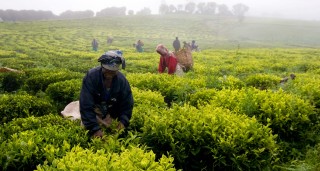Four years ago, Grant Brooke and Peter Njonjo launched Twiga Foods a mobile-based, B2B platform used by small and medium scale businesses to purchase fruit and vegetable stock from local and regional farmers in Kenya. Their aim was to formalise an otherwise informal sector by organizing the buy-side of agriculture and making access to market easy, seamless and fairly profitable for both farmers and vendors.
The process is simple – A farmer signs up to join Twiga. Twiga visits and assesses farm then adds farmer onto the system. Twiga issues a purchase order to book produce and indicate the date of harvest. Twiga harvests and weighs farmers produce and pays farmer within 24 hours. All produce is gathered at Twiga collection centres and packhouses for processing, grading and dispatch. The process works exactly the same for vendors as well, save for the fact that they are on the receiving end.
Before the platform was established, farmers in Kenya faced a major challenge in dealing with brokers who bought produce from them at very cheap rates, cheating them of the real value of their produce, and sell at high rates to vendors. This made agricultural produce quite expensive in Kenya. Lots of produce got wasted between the farmer and the market and farmers incurred losses.
“Before Twiga, we had a lot of problems with brokers. Brokers from Mombasa and Nairobi were many, they took our bananas and paid whatever they wanted to pay us. But with Twiga, we get better prices for our bananas”, says Patrick Muthee, a farmer who is signed up on the platform.
Initially, the platform started with about 80 vendors signed up, many of them making orders of at least Sh1,000 a day. But today, Twiga boasts a clientele of over 5000 vendors and over 8000 farmers in Kenya alone. And according to World Food Bank, Twiga Foods is currently Kenya’s largest seller of bananas, potatoes, tomatoes, and other staple commodities.
Twiga empowers farmers by providing them with a guaranteed market by sourcing produce directly from farmers and delivering to the doorstep of vendors. With a guaranteed market for their produce, farmers can focus on increasing their yield, growing their business and consequently increasing income.
Part of the startup’s empowerment scheme for farmers also include partnering with agricultural and financial organizations to provide farmers with value-added services like better access to loans and agricultural inputs. And by conducting Farmer Engagement Programmes monthly to educate farmers and exchange feedback on their services. This builds trust and enhances the relationship between the platform and farmers.








